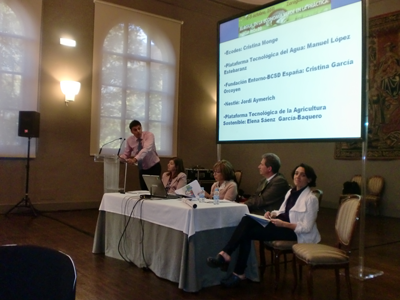- ON THE DECADE
- THE DECADE'S CAMPAIGN
- REPORTING ON PROGRESS
- THE DECADE'S PROGRAMMES
- FOCUS AREAS
-
- Access to sanitation
- Financing water
- Gender and water
- Human right to water
- Integrated Water Resources Management
- Transboundary waters
- Water and cities
- Water and energy
- Water and food security
- Water and sustainable development
- Water and the green economy
- Water cooperation
- Water quality
- Water scarcity
- FOCUS REGIONS
- RESOURCES FOR
- UN e-RESOURCES
International UN-Water Conference. Water in the Green Economy in Practice: Towards Rio+20. 3-5 October 2011
5 October 2011: Spanish business dialogue on water and the green economy
 The objective for this side event was for Spanish business representatives to discuss the challenges of water and the green economy. Business leaders involved in the management and use of water resources discussed ways to reconcile sustainable production with increasing productivity and growth. Amongst the topics discussed by the participants, including representatives from Nestlé, the Entorno Foundation, Ecodes and the Technology Platform for Water, were the influence of globalisation and food trade on water policy, barriers to valuing commitment to clean production, and specific problems in different regions of Spain.
The objective for this side event was for Spanish business representatives to discuss the challenges of water and the green economy. Business leaders involved in the management and use of water resources discussed ways to reconcile sustainable production with increasing productivity and growth. Amongst the topics discussed by the participants, including representatives from Nestlé, the Entorno Foundation, Ecodes and the Technology Platform for Water, were the influence of globalisation and food trade on water policy, barriers to valuing commitment to clean production, and specific problems in different regions of Spain.
A number of members of the Water Observatory of the Botín Foundation presented preliminary findings from their project 'Water, food security and nature conservation'. The Water Observatory is a research group of the Botín Foundation formed by scientists of various disciplines from the Complutense University and the Polytechnic University of Madrid. The project seeks to secure global water supply and equitable access to food through efficient water use which minimises environmental impact. The project is based on the assumption that many of the water challenges faced in the world stem from poor management rather than physical scarcity.
The management models proposed by the Observatory opened the debate with the business representatives. Panellists included Jordi Aymerich from Nestlé and Miguel Lopez Estebaranz from the Spanish Technology Platform for Water. This Platform facilitates technology transfer between the public and private sectors and works closely with the Ministry of Science and Innovation, the Centre for Industrial Technological Development and the Ministry of Environment. Panellists discussed important issues such as: the implications of the green economy concept for the manufacturing sector; how to create employment and wealth through cleaner production; the obstacles for implementing the green economy principles in business; and how businesses that use and rely on water can contribute to its conservation and management.
The following conclusions were drawn based on the presentations and debate that took place during the event:
- The only way out of the global crisis is building a green economy, and this is only possible if all stakeholders join efforts.
- The role of business is fundamental and sustainability shows its benefits in terms of income. All stakeholders must be moving in the same direction.
- Nature is a source of inspiration and Spain is the second most innovative country in the field of water.
- The food security challenge must be met with maximum efficiency in the use of natural resources.
- The green economy is a business opportunity: water footprint and carbon footprint labelling.
>> Conference Home
>> Statements from UN Agencies
>> Video recording of sessions

>> Ch1 Water on the Road to Rio+20
>> Ch2 Challenges and opportunities for water in the transition to a GE
>> Ch3 Thematic conference papers
>> Ch4 Conference summary: Water in the GE in practice
>> Ch5 The way forward
>> A1 Water toolbox: A contribution to Rio+20
>> A2 Feedback report
>> A3 Communications report
>> Case papers by tool
>> By region 
>> Developing countries 
>> Developed countries 
>> Agenda 
>> Economic instruments
>> Green jobs
>> Sustainable financing
>> Investments for biodiversity protection
>> Water technology
>> Water planning
>> ESCWA region
>> LAC region
>> Conference daily
>> Interviews with case presenters 
>> Presentations
>> Communications articles
>> Conference media brief 
>> Daily press notes
>> Interviews with session conveners
>> Issues information briefs
>> Tools information briefs
>> Banners
>> Reader on water and the Green Economy 
>> Conference poster 
 >> Discussion forum
>> Discussion forum
 >> Twitter
>> Twitter
>> Water, energy and food security
>> Spanish Business Dialogue
>> Stakeholder dialogue on the Green Economy in Spain
>> Technical visit
>> Organizers
>> Participants
>> Conference committee
>> Rationale
>> Tools
>> Expected outcomes
>> 2nd UNCSD PrepCom
>> Road map to Rio+20
>> Key questions on GE
Copyright | Terms of use | Privacy notice | Site Index | Fraud alert | Help





